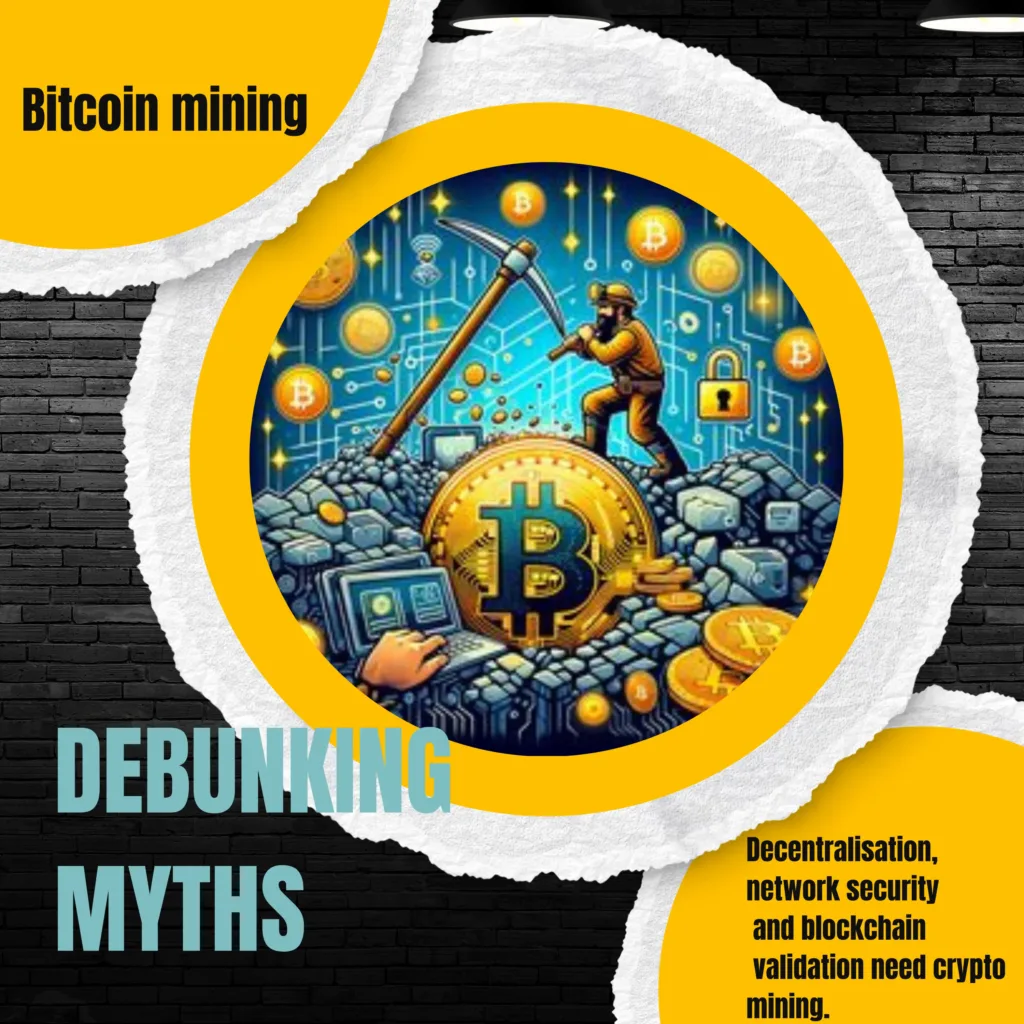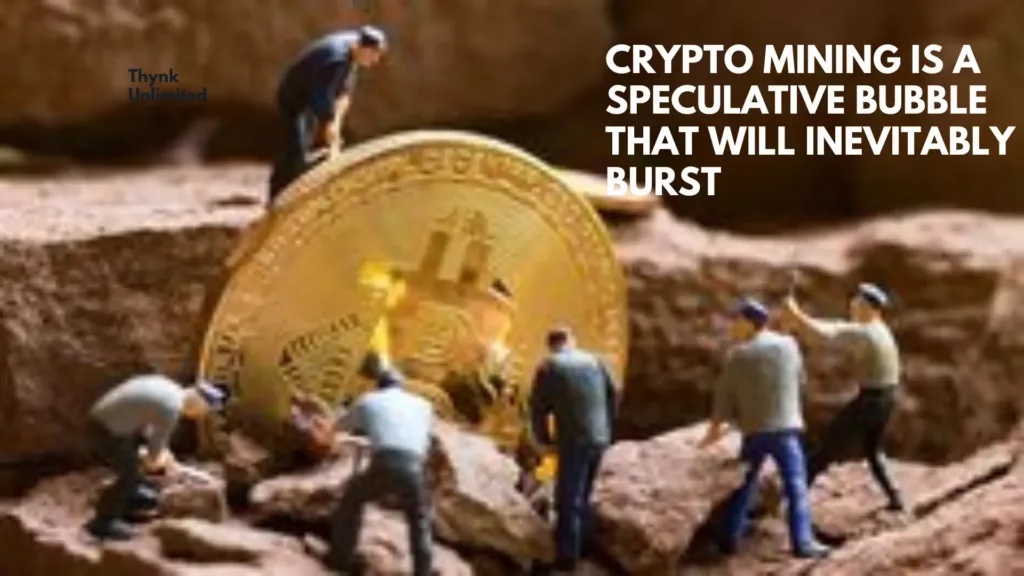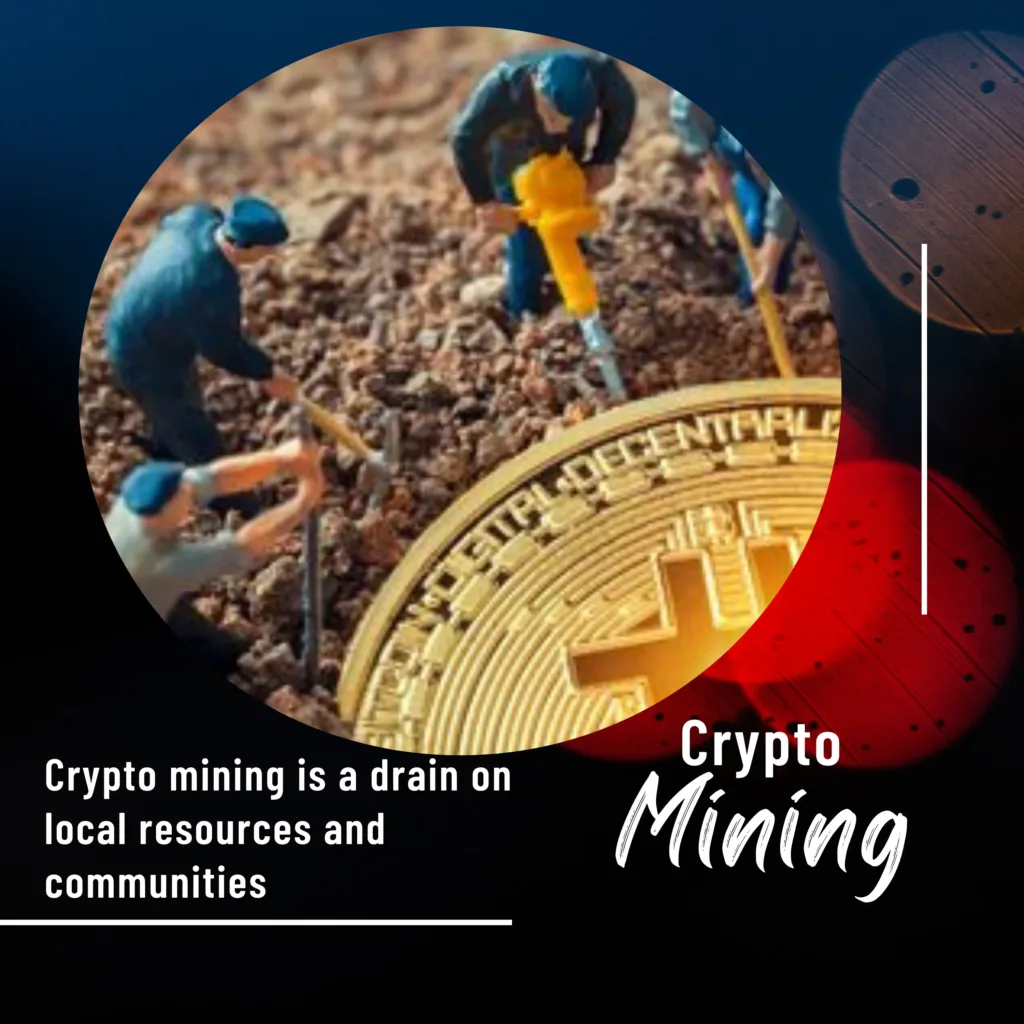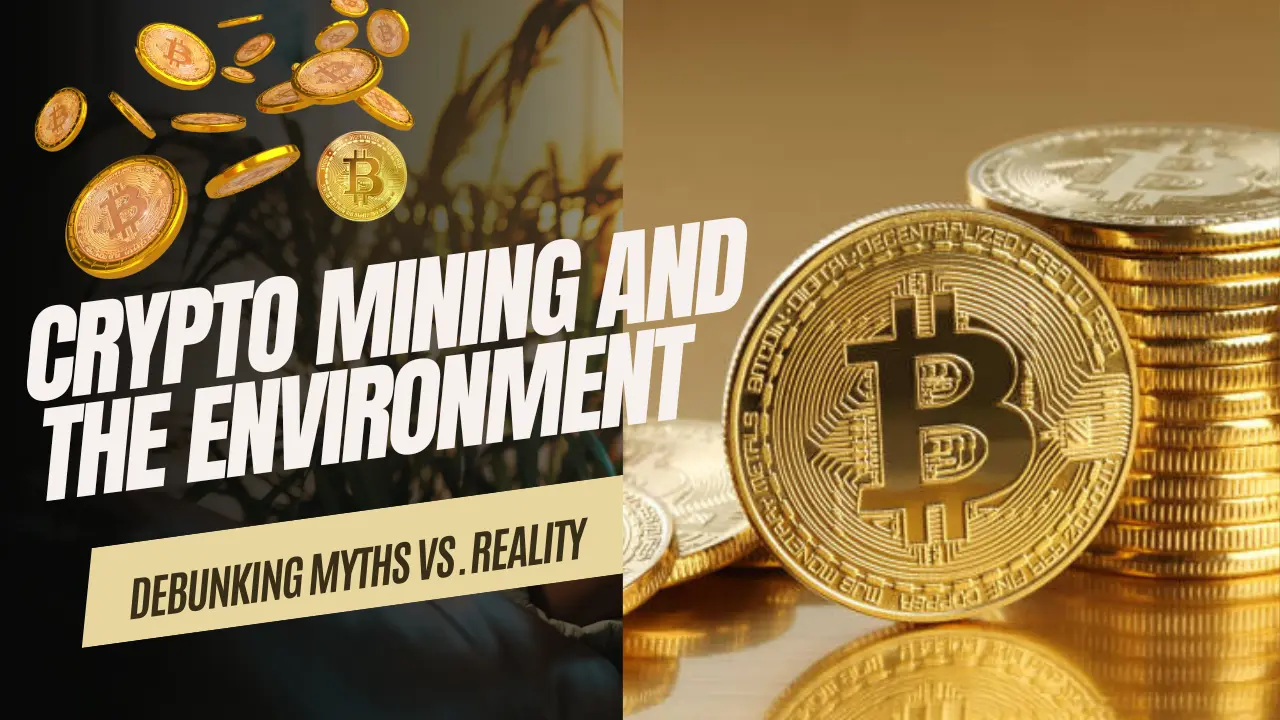Many worry bitcoin mining will harm the environment. Mine waste energy opponents say causes climate change/carbon emissions. Mining cryptos may harm the environment. This essay debunks bitcoin mining myths and evaluates its environmental impact.
Myth 1: Crypto Mining is Energy-Intensive
Despite widespread assumption, virtual money mining uses less power. Thinking and effort go into Bitcoin mining.
Cambridge Centre for Alternative Finance predicts bitcoin will use 121.36 TWh annually by April 2021. Banks and gold miners need energy.
Gold mining requires 132 TWh with 100 available, says IEA. A power source allows bitcoin mining. Technology and renewables boost Bitcoin mining.
Myth 2: Crypto Mining Fails

Crypto mining is unsocial and inefficient, argue opponents. Blockchain and Bitcoin benefit humanity, but mining harms nature. Cryptocurrencies help unbanked individuals globally.
Blockchain is utilized in healthcare, supply chain, cryptocurrencies, and voting. Blockchain transactions improve organization efficiency and accountability due to immutability, transparency, and security.
Bitcoin mining jobs, investment, and innovation help renewable energy nations.
Myth 3: Bitcoin Mining is Pointless
Decentralization, network security, and blockchain validation need crypto mining.
The blockchain is safeguarded and managed via Bitcoin mining. Miners’ computations guarantee transactions indefinitely. Block insertion to a blockchain requires complex arithmetic and cryptographic hashes. Miners avoid double-spending for decentralization.
Secure transactions require blockchain miners. Bitcoin confidence would suffer from manipulation and fraud. Mining enables peer consensus and transactions on decentralized blockchains. Blockchain solutions are verified by Bitcoin mining.
Myth 4: Bitcoin Mining is Short
Bitcoin mining is green yet energy-intensive. Cryptomining now addresses the environment.
Mining companies use hydro, solar, and wind. Sustainable energy firms battle global warming by building renewable energy infrastructure.
Mining gear energy efficiency algorithmic optimization research continues. High-efficiency ASICs save hash energy.
Mining sustainably and updating gear are priorities. Mine waste heat saves industry energy.
Limits and incentives for Bitcoin mining may reduce environmental effects. Responsible mining and alternative energy need government, industry, and environmental cooperation.
Large mining pools threaten decentralized cryptocurrency security and centralization.
Decentralized Bitcoin mining fails. Centralization and 51% attacks are likely when a few pools mine Bitcoin.
1. A 51% attack might stop mining, change transactions, or double-spend Bitcoin. Bitcoin mining power concentration impacts security and decentralization.
Many recommend decentralizing mining to solve non-PoW consensus in numerous currencies. PoS mining requires cash, not computers. Members can keep or stake money to avoid mining power concentration.
2. Mini-mining: Avoid solitary pools by teaming. Community mining cooperatives and renewable energy help smaller miners.
Lastly, some mining pools limit hash rates for transparency. Miners may monitor each other’s pools to avoid overcontrol. Fourth, secure, scalable, decentralized, network-enhancing cryptocurrency protocols. Bitcoin Taproot makes decentralized mining fair and efficient.
Myth 5: Crypto Mining Depletes Civilization
Electric crypto mining creates jobs, taxes, and community progress.
Water and power-intensive crypto mining improves the economy.
Miners hire unemployed. Technicians, engineers, and administrative assistants operate mining equipment.
Myth 6: Crypto Mining is a Drain on Local Resources and Communities
Mining benefits areas. Investment and mining workers may get better meals, lodging, and services. Local companies may benefit.
Growth, jobs, and taxes help local governments. Taxes fund schools, hospitals, and roads.
CSR helps mining communities with education, environment, infrastructure, and charity. Mining firms sponsor community activities to demonstrate commitment and establish partnerships.
Crypto Boom: Blockchain security requires mining, not speculation. Even in volatile markets, miners decentralize.
Myth 7: Crypto Mining is a Speculative Bubble that will Inevitably Burst
Bitcoin investing is risky. Crypto mining helps blockchain networks, therefore calling it a bubble is ridiculous.
Miners verify transactions and add blocks to decentralized blockchains. Ecosystem trust is threatened by crypto manipulation and fraud without miners.
Bitcoin’s popularity will boost mining. Blockchain identity verification, supply chain management, and decentralized banking need security.
Blockchain’s value ensures bitcoin mining regardless of price. Blockchain’s irreversible, decentralized record-keeping may improve efficiency, transparency, and security.

Myth 8: Rich Mining Crypto
Pools, clouds, and cooperatives ease bitcoin mining. Today, ambitious crypto miners and small enterprises may join. Computer and internet users can mine Bitcoin with hardware and pools. ASIC miners and consumer-grade GPUs can create Ethereum, Bitcoin, and other mining rigs.
Processing power and blocks ease mining. Miners gain. Small miners can compete with large corporations for greater rewards owing to resource pooling.
Miner entrance is easy with cloud mining. Cloud mining customers can rent computer power from mining firms, bypassing expensive equipment and intricate setups. Although it has downsides, cloud mining is advantageous for individuals without the technical skills or upfront expense of conventional mining.
Cooperative and pool mining can be more profitable than cloud and individual mining. Wide-ranging profit-sharing cooperatives last.
Myth 9: The Transformative Power of Crypto Mining

Crypto mining safeguards blockchain networks, enables decentralized banking and supply chain management, and encourages peer-to-peer transactions, contrary to common opinion.
Bitcoin detractors ignore blockchain’s revolutionary potential. Blockchain is employed outside banking due to its adaptability.
Manage supply chains with blockchain. The irreversible blockchain record lets companies track goods across the supply chain with authenticity, transparency, and accountability. Without counterfeiting or fraud, supply chains are more reliable and efficient.
Blockchain improves ID verification. Blockchain IDs protect identity. Finances, health, and state are affected.
Blockchain-based DeFi eliminates intermediaries, democratizing finance. DeFi smart contracts enable bankless p2p lending, borrowing, and trading. It could change international banking and empower the poor.
Digital art, collectibles, and gaming use blockchain NFTs. Unique NFTs represent art, virtual property, and music. Commercialization, ownership verification, and value creation are possible with blockchain tokenization.
Conclusion
Businesses and consumers benefit from blockchain. Blockchain may solve NFTs, DeFi, ID verification, and supply chain management. Blockchain’s many uses may boost digital economy efficiency, transparency, and innovation.
Crypto mining environmental concerns are overblown. Reduce bitcoin mining energy sustainably.
Renewable electricity, sustainability, and energy efficiency are needed for green Bitcoin mining. Blockchain and crypto may benefit society and businesses. Crypto mining knowledge informs debates and promotes an ethical and sustainable crypto economy and the planet.

1 thought on “Crypto Mining and the Environment: Debunking Myths vs. Reality”